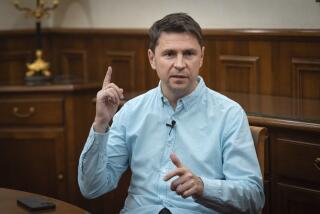Soviet Economy Plan Is Sound, Architect Insists
- Share via
MOSCOW — Whether or not the West pitches in with the massive aid and investment that Moscow is hoping for, the Soviet Union must go ahead with the radical economic reform outlined in the ambitious new proposal known as the “Grand Bargain,” the plan’s main architect said Friday.
Economist Grigory A. Yavlinsky complained to reporters that the media have overplayed his plan’s call for tens of billions of dollars to be pumped into the Soviet economy over the next six to seven years, ignoring its emphasis on self-help and the rapid changeover from a planned to a market-driven system.
“Even if the West says, ‘No, we won’t do anything,’ ” Yavlinsky said, “the plan must be implemented.”
Yavlinsky appeared to be responding to the skepticism with which American officials have greeted the prospect of a Soviet request for major aid. The plan has also drawn harsh criticism in Moscow this week, including that of Prime Minister Valentin S. Pavlov, who denounced the idea of his country becoming a supplicant for international charity.
President Mikhail S. Gorbachev is expected to propose a modified version of the Grand Bargain when he speaks with leaders of the world’s major industrialized democracies, known as the Group of Seven, after their meeting in London July 15-17.
“I have no idea that Mr. Gorbachev will come back from London with a suitcase with the money,” Yavlinsky said. “The best thing that can happen in London is that the governments of the Group of Seven would say, ‘That is a serious problem; we have to look at this problem.’ ”
He said he would be satisfied if the Group of Seven countries decided to simply study the proposals for the next six months because at least during that period the Soviet people would “know that something happens, that we’re going somewhere.”
Gorbachev authorized Yavlinsky to bring a draft of the project to the United States and work on it with American academics at Harvard University in recent weeks, but the Soviet president’s full-fledged support for it remains in question.
Yavlinsky said that his plan has Gorbachev’s basic approval but that he is still waiting for the president’s “substantial reaction” and perhaps an order to present it to European governments before the London meeting.
Gorbachev told reporters at the Soviet Parliament on Friday that he would combine Yavlinsky’s plan with other proposals and come up with a “program of the president” to present in London.
“You know, all the programs that we have received have very much in common,” Gorbachev said. “There are absolutely no insurmountable problems.”
Yavlinsky said, however, that he could not imagine combining his plan, which essentially creates capitalist institutions at a rapid pace, with Pavlov’s far more conservative “anti-crisis program.”
Gorbachev’s hesitation raises the specter of a repeat of his maneuvers last autumn, when he appeared to accept a crash, 500-day reform plan--also authored mainly by Yavlinsky--and then abandoned it, citing the need to merge several programs.
But Yavlinsky said he thought that Gorbachev had learned “a great lesson” when he gave in to conservative pressure last year.
“I believe that maybe they’ll not repeat this mistake,” he said.
He added that the Grand Bargain appeared to win basic approval from President Bush as well as from leaders of the Soviet Union’s constituent republics. Yavlinsky met with Bush in Washington before returning to Moscow last weekend.
Although Yavlinsky disclosed few details of the plan, it apparently resembles closely his 500-day program of last year, calling for the widespread sale of government property to private owners, freeing prices, establishing a new banking system, levying taxes that encourage economic development and ending subsidies for industry.
The plan actually asks relatively little in American aid, Yavlinsky added, although he did not give a total of how much Western assistance the Soviet Union would need.
“The United States may need to spend like 1% of its defense spending,” he said. (That would be about $2.7 billion annually, based on the current Pentagon budget.) “All the rest are credits from international organizations.”
More to Read
Sign up for Essential California
The most important California stories and recommendations in your inbox every morning.
You may occasionally receive promotional content from the Los Angeles Times.













